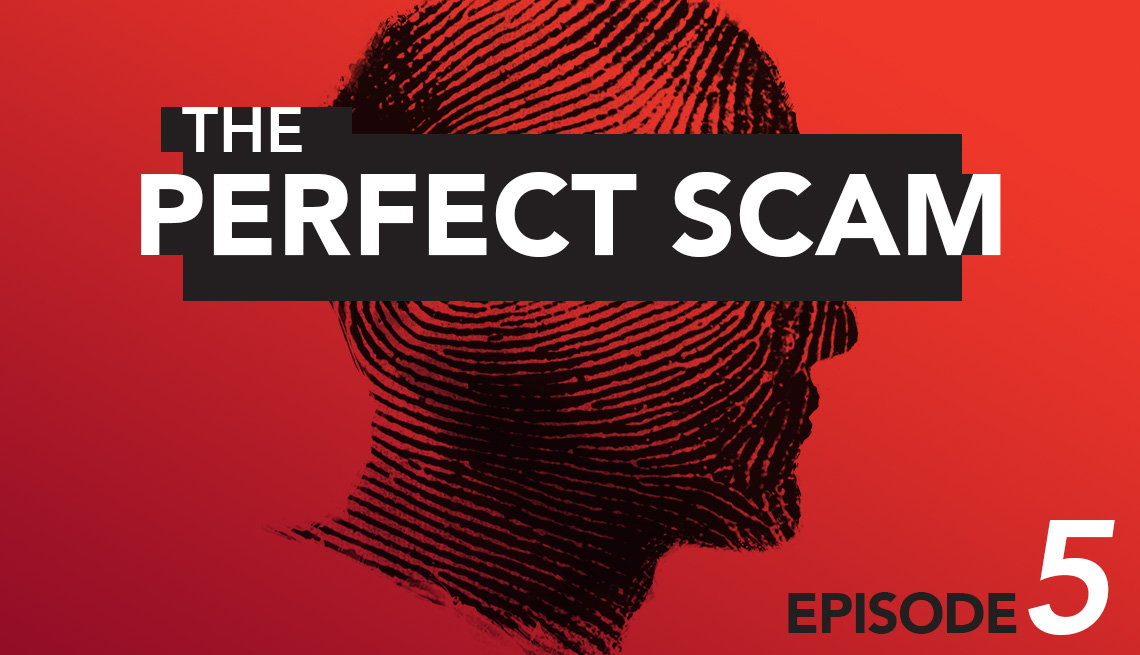
- Select a language for the TTS:
- UK English Female
- UK English Male
- US English Female
- US English Male
- Australian Female
- Australian Male
- Language selected: (auto detect) - EN
Play all audios:
[00:00:01] HOST: Coming up on this episode of AARP's Perfect Scam. [00:00:06] This man disrespected me in every way possible. He was playing on my heart strings. He, he took me for
every penny. [00:00:14] HOST: Online romance is a hallmark of modern of life. Connecting lives, making sparks, and unfortunately, in many cases, creating victims. On today's episode,
you'll hear the story of a woman who is just looking to meet someone, and ended up giving away a lot more than just her heart. We'll tell you all about how these scammers operate
and what to look out for. I'd like to introduce my cohost and AARP's Fraud Watch Network Ambassador, Frank Abagnale. Frank, thanks again for joining us. [00:00:40] Frank Abagnale:
Good to be with you, Will. Thanks. [00:00:42] HOST: Must be good to be an ambassador, that's a good title to have in addition to your other titles. [00:00:45] Frank Abagnale: Yeah,
another somebody I never impersonated, but... [00:00:49] HOST: Well you bring up actually a good point. I've been meaning to ask you, were there ever any professions or impersonations,
impersonations that you did not do that you thought about, or that maybe you could have done but didn't get around to? [00:01:03] Frank Abagnale: No, people always asked me why you
didn't impersonate a priest. I said, well there was no money in doing that. [00:01:09] HOST: Right, maybe taking, taking the money at service but that's about it. [00:01:13] Frank
Abagnale: Yeah, I think again as we discussed, most of my impersonations had some meaning or purpose to them, whether a pilot to get cashed checks or fell into the doctor or the lawyer. They
all were things that I didn't premeditate, so they weren't things that I thought I was going to, but I don't think there was anything I would have liked to impersonate and
hadn't done. [00:01:30] HOST: You mentioned the doctor and that's a great story. You're in Atlanta, can you tell us about that when you got to the apartment complex where you
were renting an apartment and all of a sudden you took on this new guise? [00:01:43] Frank Abagnale: Yeah, actually that was the Riverbend Apartments in Atlanta. They're still there,
but they're condominiums now, still called The Riverbend, so Stephen Spielberg actually had to have their permission, so at the end of the credits it says, "Permission from
Riverbend Apartments." [00:01:57] HOST: And that's kind of a swinging scene in the movie it's like... [00:01:59] Frank Abagnale: At the time it's like... [00:01:59] HOST:
There's a lot of young people partying. [00:02:01] Frank Abagnale: Yeah, because back in the day those were singles' complex, so you could, you could only live there if you were
single. Later on the courts ruled that you can't discriminate against people in apartments, so those kind of went away, but in their day in the '60s, in the late '60 to early
'70s, that was the swinging place to be. Everybody was single, and mostly professional people, this particular apartment complex, a lot of airline people and flight attendants. That was
another reason I didn't want to do the pilot, because I was afraid I'd start running into people who might be a little suspicious that I wasn't a pilot. [00:02:34] HOST: That
seems like one of the biggest hazards of impersonating somebody, is running into too many people that actually do that. [00:02:38] Frank Abagnale: And that's kind of what happened at
Riverbend, because I basically had gone there, and when I was filling out the application it asked me a profession and occupation, and I thought to write airline pilot, but the two things
that entered my mind was, one, there were a lot of airline pilots that lived there, and flight attendants, and two, they were looking for me as the pilot. So I thought I need to come up with
something else, so I just wrote down the word, doctor, never pursuing it to go any further, but had a very inquisitive apartment manager and said, "Oh, I see here, you're a
doctor." And I said, "Yes." She said, "What type of doctor are you?" And so I said, "Medical doctor." And then I quickly said, "However, I'm not
practicing medicine right now. I left my practice out in Los Angeles to come to Atlanta to invest in some real estate I have." And then she asked me what type of doctor I was, and I
said, pediatrician because I knew it was a single's complex, there were no children there, and I thought that would be pretty safe, but of course, I moved in and I ended up meeting a
real pediatrician who lived there, and befriended him, and I got to know him, and then he would take me up to the hospital to meet other people, so you find yourself learning a little bit of
the jargon to carry on the conversation, be able to answer where did you go to school and questions like that. [00:03:47] HOST: But you must have had to steer clear of getting too detailed
about the work, right? So hey, Frank, how would you deal with this problem or... [00:03:53] Frank Abagnale: Absolutely, and so you know I was always smart enough to know that you can carry
these impersonations so far, but sooner or later someone was going to find out, so people used to ask me why you were the lawyer. No one ever detected you were not the lawyer, you had passed
the Bar, why didn't you stay on just being the lawyer? Well you can only get away and fool people for so long and sooner or later someone's going to find out, so someone might
start getting inquisitive, and you know when you're, when you're a con man, you live a chameleon existence but you have to get along with everybody, so even if there's
somebody that you don't like, you have to purposely make an effort to get along with them, because the minute someone doesn't like you, they start to find fault in you. And they
start to quiz and be suspicious of you. So that's where you start to get the things, so you went to Harvard. Who was your professor in such and such? And did you know so and so? Those
are the kind of things that start happening and you don't have the answers to. [00:04:48] HOST: I would just say stomach pain at that point. [00:04:50] Frank Abagnale: Yeah, right, so
it's a very hard life to life is what I'm getting at. You can't go in personate someone all your life, cause you're going to have, always people who like you and
they're going to look for fault in you and thus, they're going to start being suspicious of you. [00:05:03] HOST: I'm thinking more about this ambassador impersonation though.
It would be a good one if you could go to another country and somehow take on the guise of an ambassador and I don't know, live a wealthy life. [00:05:14] Frank Abagnale: A wealthy
life, it wouldn't be a hard job, just going around shaking hands with people [00:05:18] HOST: Yeah, it's the person, so if anyone's out there thinking, now I'm just
joking, please, don't do that. (MUSIC SEGUE) [00:05:22] HOST: On this episode, we're going to introduce our listeners to a woman who was looking for a connection online and maybe
even something more. Tracy's story underscores how scammers have a special power over their targets when the scams involve the heart. [00:05:37] Tracy: Hello? [00:05:38] HOST: It's
Will at AARP. [00:05:40] Tracy: How're you doing? [00:05:40] HOST: I'm good, how are you? [00:05:41] Tracy: Okay, thank you. [00:05:42] HOST: Tracy's husband passed away in
December 2014, and after a few years, she decided to try her luck online. [00:05:48] Tracy: I went onto a dating site and found, or came across this one gentleman, I sent him a little how
you do or what have you, and he in turn responded and we go on from there talking back and forth on his so-called home and business line. [00:06:10] HOST: Were there other people that you
were talking to as well that you liked, or had this guy become sort of the one that seemed like maybe he's, he's a match? [00:06:16] Tracy: He, he was the, the one, you know that,
that you know, because he told me all about himself, he sent all kinds of information as to what he likes, what he does, you know, he's right-handed with this and left-handed with that
and he had explained that he had his late wife, he met his wife in, when he was in college here, because he was born in Geneva, Switzerland, and he met her, they got married, had two
daughters, however she was killed in an automobile accident and along with the two daughters and he's been alone for quite some time, so you know that didn't impress me in any way,
however, being vulnerable as I was told I was, you know, having someone talk to you and you know, just all, sort of like give themselves to you, you know, in words and expressions. We were
talking on the phone, we were writing emails... [00:07:23] HOST: Tracy's connection with this man continued for a while, until finally the plot thickens, and the story takes on a rather
unique turn. [00:07:31] Tracy: He had told me that he had put in a bid to leave the country and, you know, I said, "Well what day are you going?" And when he told me, I said,
"Oh, that was the day I was planning on hoping to meet you." And what I did was what I did was I went online to see what airline he could have picked up from Newark or New York
going to Egypt or even a stopover and I could not find anything. [00:08:02] HOST: And what, what made you, what prompted you to do that? [00:08:06] Tracy: Just out of curiosity's sake,
I guess. You know I just wanted to find out because most of the time when I asked him a question, he had told me he would always answer the question, but every question I asked was always
with a backlash of why do you need to know that, and how is that important and you know what's going on? [00:08:31] HOST: So you felt like he, he was open and relatively honest but
there was also part of you that maybe was a little curious and maybe suspicious? [00:08:41] Tracy: Tracy: True. And but I did do a background check on him and Spokeo came up with all of
these information on him as he had explained. [00:08:53] HOST: Had you done, did you do a background check before he left the country or was that as things, as he started asking for money or
later on? [00:09:01] Tracy: Later on, later on. [00:09:03] Let me back up and I'll try to remember to get back to where you are now. But he had along the line, once he was overseas
come up with excuses for you to send him, to send him cash. [00:09:13] Tracy: Yes. He used the excuse that the, the country would not accept his credit cards. He could not an ATM card, and
being a noncitizen of the country, he wasn't able to go to a bank there and withdraw any money or get a cash advance without, with the credit cards and what have you. It got to a point
of where I had to send money by Western Union, and then it also went by MoneyGrams, right. [00:09:51] HOST: Did you feel at this time when that was all going on, and I'm, correct me if
this is wrong. I sort of imagine you as being caught up in this what felt like a romance and also helping someone out who you potentially cared about. [00:10:03] Yes, I really thought, I
really thought that I was doing something good because, you know even though it was a, really an extensive, I thought I was helping him out. He, he really got a hold of me emotionally and,
you know, he was like crying for help, always crying for help, and I thought, well, you know, here's a guy who's down and out in another country and he can't get home because
they keep on taking away his passports, you know, and he didn't have the proper paperwork. He supposedly was supposed to be working and then something happened to his tools. He left
them in the cab, filled out a police report and then he needed to rent tools because he claims he was an electronical engineer, only to find out later on after all of this transpired, I
called the Better Business Bureau for New Jersey, New York, and Connecticut, and I found out that he was not in either New York or New or Connecticut, and his name of the company was not
listed in New Jersey, but the woman did ask me, what phone number did he give you? And I, I told her what the phone number was, and she said, I just want to let you know he's a very,
very, very, very, very bad man. [00:11:36] HOST: Oh my God, so they, they knew about him and was she able to, give you any more details about him? [00:11:42] Tracy: Well she told me
he's not an electrical engineer, he's a construction workman. [00:11:46] HOST: So eventually you, you realize this guy in Egypt and elsewhere, he left the country, he was, he was
asking you for more money, and you spent, what would you say on, on this guy? Are you willing to share? [00:12:00] Tracy: The whole total came to $139,000. [00:12:05] HOST: Wow, so that,
that's not a small amount of money. [00:12:08] Tracy: No, it was personal money and it was a small loan, borrowed money from friends and all cash advances. [00:12:19] HOST: Is it safe
to say you were completely caught up for a while in this story? [00:12:24] Tracy: Yes. [00:12:26] HOST: Yeah. Is it hard to talk about? [00:12:28] Tracy: At times, but I'm, I'm
okay with it. [00:12:31] HOST: You sound like you are and I'm glad, yeah. [00:12:33] Tracy: I'm, you know I, I've gotten over the, the crying period. I was clinging on hope
that he, he was for real. I really was. [00:12:41] Did you feel like that you were in love? [00:12:43] Tracy: Not necessarily. I, I felt a, a connection but I, I felt more like he needed
help and he said he didn't have anybody to help him. He had no family, so I was there for him. [00:13:02] HOST: Toward the end, after Tracy had shelled our more money for a man she
never met, he asked her to go to an Apple store and buy thousands of dollars of products. And sometimes, they were very specific requests. [00:13:13] HOST: Did he give you, like a shopping
list, in other words to go to Apple with and just pick up... [00:13:17] Tracy: Oh yes. Oh yes. [00:13:18] HOST: What kind of stuff? [00:13:19] Tracy: I had to buy rose-colored phones, and
rose-colored laptops, that the Mac Pro, the Apple Mac Pro and oh gosh, the one total came to $4,172 and change, and the other one was $4,810 and change. [00:13:43] HOST: And he specified the
color. [00:13:44] Tracy: Oh yes. Yes, it had to be this color. [00:13:47] HOST: You're able to talk about this all very calmly. It sounds like a really humbling experience. [00:13:55]
Tracy: Yeah, you have to eat crow. You have to eat crow. I explained certain things to my mother, but did not tell the rest of the family the amount of money I spent, because my one sister
disowned me. [00:14:12] HOST: That sounds really, really hard. You sound like a lovely woman and I hope you don't have to eat crow for much longer. [00:14:20] Tracy: Four years. I,
it's going to take four years to repay the credit card companies. [00:14:29] HOST: And you're doing your best, it sounds like, to put things back together. When you think back on
this guy who you, you know you had a voice to put with him, what, what feelings come up for you? [00:14:42] Tracy: Uh, drastic. Him ruining my life, taking advantage of me, and you know,
making me a fool. This man disrespected me in every way possible by scamming me out of every penny I had. [00:15:05] HOST: Tracy eventually contacted the Federal Trade Commission, the state
Attorney General, local police and even the FBI. [00:15:12] Tracy: They will not contact me unless they get a hold of him. Then they will bring him to justice. [00:15:20] HOST: It's
hard to imagine getting caught up in something like this, wiping out savings, taking out loans, borrowing money, all to help out someone you've never met. It's heartbreaking to
listen to Tracy, and it might be easy to scoff at how she got sucked in, but you have to try and put yourself in her shoes. A widow, living alone, making a connection. And someone on the
other end of the line who's very, very good at taking other people's money. [00:15:44] Tracy: He was playing on my heartstrings. He, he took me for every penny. (MUSIC SEGUE)
[00:15:57] HOST: Frank, Tracy's story has probably a ton of red flags. But we also want to make sure we note that how much we appreciate these people coming forward and talking to us
about these things. It does help other people who might be going through something similar, so I want to mention that. [00:16:14] Frank Abagnale: Absolutely, I think it's great and I
think that you know, as I always say, anybody can be scammed, anybody can be ripped off no matter how intelligent they are, so it's nothing to be ashamed of. These people are experts at
doing this. They're very persuasive, they have things that make you believe what they're telling you is the truth, so again, if you're a victim of this, just like she did,
you, it's better to talk about it and tell someone, so they don't become a victim of it and learn from somebody else's mistake. You know, as you get older, you realize that
you always learn by other people's mistakes. If you don't, then you have a, you have a problem. I would assume that her sister, based on what she said is that her sister probably
was being a confidante, she was telling her sister all these things and her sister kept telling her don't send this man any money. Don't give this many anymore money, don't do
this, and she kept doing it and out of frustration, the sister just really got mad and I'm sure the sister will come back, cause she's her sister, but obviously got very mad. And
you hear a lot about that where someone may say, I won this Mercedes on a sweepstakes scam, I have to pay this money, but they keep paying money and the family's going, Dad you paid
more money than the Mercedes cost you. You could go out and buy the Mercedes. Why do you keep sending this money and it gets very frustrating for the family members where they almost say,
I'm not going to talk to you anymore cause you're not acting rational and all that, so that's probably what happened with her sister. [00:17:41] HOST: Right, I mean you had
actual instances, like you say, a family member's a sort of, you know beating on people saying, look, don't send any more money, don't, you know, this guy's a fraud, this
guy's a scam, but people are so deep into something, and caught up that it's hard to get out of that moment. [00:17:54] Frank Abagnale: Right, and the rose-colored computer and
I-phones and laptops, that was just him selling that over that, so he's telling someone I can get that for you, and they sell for a lot more over there than she putting out...
[00:18:06] HOST: So not uncommon that he's asking for specific products? [00:18:08] Frank Abagnale: Yeah, he's selling those and I said to him, can you get me a rose-colored this,
a rose-colored that, and I can get that for you, and he was getting her to buy it and then he was selling it and getting the money. [00:18:18] HOST: And as we've heard with romance
scams, it sounds and seems like this guy's putting a ton of time into this one instance, but he's got more. [00:18:26] Frank Abagnale: She's one of many. Again it seems like a
lot of time and a lot of effort, but they're working so many different scams, kind of like a salesman who says I have 9 deals out here, I'm working each deal every day, I'm
having to put all this effort in, I'm hoping to close these deals. It's the same thing. He's hoping to close on all of these things, but he's working all of these 9, 10
different women at a time, and each are bringing him money, so it's not just the money she gave him, it's the money all these other people are giving him at the same time.
[00:18:54] HOST: She talks about Spokeo and background checks, how much can that do for somebody if you go online... [00:19:00] Frank Abagnale: Those aren't real, those are not really
effective because you can manipulate those, you can provide information. It's like saying you have a company and you have a Dunn & Bradstreet report with them. Well, whatever you
tell them is what Dunn & Bradstreet reports, so that's kind of like those sites, so if I was really in that position, I would have gone through a private security firm, a private
investigator and did a background check, cause she, for a very small amount of money vs. what she paid, she could have hired a firm and they could have given her an accurate of who this is,
and this is this person's background, this is their history, whether they've ever been arrested or not been arrested. But that would have been factual information, not just
information he supplied as part of the background. [00:19:40] HOST: So you see a lot of that online, whether you look up a phone number, or a person that maybe you dated 20 years before and
you're wondering where they are today, or whatever people are doing out there. You then can find a phone number, but then you'll see a lot of ads for, you want to learn more? You
know, pay this much money to learn more. [00:19:55] Frank Abagnale: Yeah, but those, they really don't have a lot of information and if you’re a scam artist, and you're doing
something like he's doing, the first thing you would do is make sure you're setting up a background, knowing that people nowadays can google your name, they can check things out
about you, they can find things out about you online, so in that case, you want to then put out false information about yourself; that I work for this company, I've been with this
company this many years, and those online services, those, they pick up on that information but again, it's self-serving. It's provided by the scam artists, so that if someone does
a little background check through those type of sights, that's what they're only going to see what they wanted him, for them to see, where through a private security company, a
reputable company, they would have actually done a thorough background check and certainly would have saved her a lot more money than she gave him. [00:20:44] HOST: So, this sort of amateur
googling and checking on people, that people are able to do without spending any money, I mean it's rife with problems, right? [00:20:54] Frank Abagnale: Oh sure. [00:20:55] HOST: I
mean Google's great, but it's also, it can lead you astray. [00:20:58] Frank Abagnale: Right, as we talked on another episode about LinkedIn, I'm providing that information.
I'm telling you that I worked at this company and I'm vice president and I've worked at this other company, I graduated from this college. This is why a lot of people are a
little leery there, because I associate with you only because you're a very well-known person in your field, so I tell you that I want to associate with you on LinkedIn, because then
people who see my name associated with you, assume that you and I are friends or we're business associates. When you've actually never met me, you don't know a thing about me,
but it gives me instant credibility. So a lot of these things are manipulated for the use of the person who's using it. [00:21:35] HOST: Is there much we can do to manage the profile
we have online in terms of how, what comes up when people search our names, or you know if we have a Facebook account. What can we do if we want to start cleaning stuff up? [00:21:49] Frank
Abagnale: Well, you need to try to get your name off a lot of those sites. There is a company in San Francisco called Reputation.com, and for a small fee they go online to where all your
name is used, your social security number, dates of birth, information, where they're legally allowed to remove it from sites that social media sites and things like that, that they
remove it, and it's a small fee. You know, you can't remove it from government agencies and federal agencies, and things like that, but they get rid of it a lot where you
don't want your name popping up all the time, information about you. You know, it's kind of amazing how much information's out there. Even if, I mean if you go to even
Wikipedia and you put my name in, I mean over in the right corner, it gives you my date of birth, it tells you where I was born, it tells you my wife's name, it tells my children's
names, you know it gives you all of that information and even my wife, who has never been on any social media, she's never really been in any kind of media whatsoever, you can google
her name and it says she's married to me, so I mean you know it's just, I mean so there's all this information out there. The question is, how accurate is that information?
And most of the time it's not very accurate, or it's what the person who's providing information wants you to believe. [00:23:03] HOST: Right, so there's not a lot we can
do to fully disappear online. And your name is actually a little more recognizable than my last name. [00:23:13] Frank Abagnale: Because we've got way too much information out there. I
always say that if five years ago, if you said to me, Frank, there's this guy in Northeast Georgia, he's a carpenter, but he doesn't really do a lot of work, he lives in a
small town about 8,000 people, he's never been in the newspapers, he doesn't have a lot of friends, can you google him? I said, well no, I'm probably not going to come up with
anything. But today, that's not the case. Today, the truth is, and this is the honest truth, if you, if I know your last name, and I have your zip code, there's nothing I
can't find out about you. I just need those two pieces of information. Your last name, your zip code. [00:23:49] HOST: Even if it's Smith. [00:23:50] Frank Abagnale: Yeah, because
there is way too much information out there and every piece of information leads to another piece. So if I see on LinkedIn that you graduated from University of Maryland, I go to the
yearbook, the year you graduated online, cause I want to see who you befriended at the University of Maryland, maybe the woman you married, now I have her maiden name, cause you married her
while you were at school, I mean every piece of information leads to another article, some clipping about you, I know every bankruptcy, every judgement you had against you, every lien that
was of public domain. I mean it's so easy to find out that information. [00:24:23] HOST: Which could be useful for identity theft, or for just making a phone call and convincing
somebody that you know a lot about them. [00:24:30] Frank Abagnale: Right. You know identify theft people, I wrote about it back in 1988 and people said to me, how did you know about the
crime? I said, well no it was a crime in '88, there were no computers, there were no emails, there were no laptops but back in the day, criminals would basically read in the newspaper
that Robert Johnson was named Homebuilder of the Year. So they'd read the article and it said that Robert Johnson 10 years earlier filed bankruptcy, so they'd go down to the
federal bankruptcy court, microfiche out a copy of their bankruptcy, which is public record, and they had his wife's signature, his signature, his date of birth, her date of birth, his
social security number, her social security number, and they stole their identity. The only difference today is you can do that from thousands of miles away on your laptop. You don't
have to go down to the bankruptcy court, sit there and microfiche it out, so technology has made it a lot easier, a lot faster, and certainly a lot more global, and we continue to put out a
lot of information. [00:25:22] HOST: I'm glad we finally got a mention of the microfiche into this podcast, for those, for those who are younger and don't know that that is, google
it or do some research. You'll figure it out. But it used to be the way we did a lot of research. So, just to clarify, there's steps you can take and you mentioned Reputation.com
is a place to go, work on getting yourself off of social media and any place where you can legally disappear, but as far as like really going off the grid and disappearing, almost
impossible? [00:25:49] Frank Abagnale: Almost impossible in the too much information world that we live in today, because even if you remove your name from all these things, if it was even
feasible to do so, it's just going to resurface again, because you're going to do something that's going to resurface your name, and it'll come up and then people will
pick up on that and that'll bring up other information or connect to some other piece of information, so it truly, this is why criminals who escape from prison or something, and they go
try to change their name and go live somewhere else, eventually some piece of information brings you back to that, that individual, because we absolutely, truly live in a way too much
information world. [00:26:25] HOST: It's hard to be on the lam or live as like a hermit these days. [00:26:29] Frank Abagnale: Absolutely. Someone can find out anything about you if
they really want to. [00:26:32] HOST: Frank Abagnale, he's added Ambassador to his resume. He is the AARP Fraud Watch Network Team Ambassador. Thanks a lot. [00:26:39] Frank Abagnale:
Thank you. [00:26:40] HOST: If you or someone you know has been a victim of a scam, please call AARP's Fraud Watch Network Helpline at 877-908-3360. Alright, I'd like to thank our
producers, Julie Getz and Brook Ellis, our audio engineer, Julio Gonzales, and of course my cohost, Frank Abagnale. And be sure to subscribe, download, rate, and of course, like our podcast
on Apple Podcast or wherever you find your favorite podcasts. For The Perfect Scam, I'm Will Johnson. END OF TRANSCRIPT









